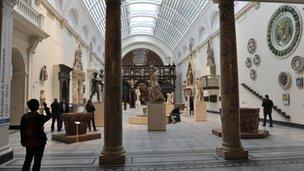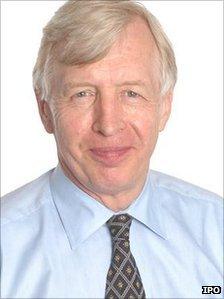Copyright licensing system 'needs to be streamlined'
- Published

The Victoria and Albert Museum spent thousands of pounds tracking down rights holders for one exhibit
Copyright licensing needs to be made easier and cheaper to use to support the UK's digital economy, according to a government-commissioned study.
An independent expert was appointed in November to investigate whether the current process was "fit for purpose".
After studying evidence from creative industry leaders,Richard Hooper concluded, externalthat existing systems "need to be streamlined".
It paves the way for the creation of a "Digital Copyright Exchange".
The system would act as a "one-stop shop" database collating copyright information from a range of industries that could be accessed online.
Richard Hooper, a former deputy chairman of the broadcast regulator Ofcom, said such a move would help small and medium-sized businesses launch new digital services over broadband and mobile networks - potentially creating the next Spotify or Netflix.
He added it should also prove beneficial for existing media giants.
"[This] will drive economic growth across the UK's creative and technology industries," he told the BBC.
"Also if the media companies are seen to be doing everything possible to enable and encourage new digital services via easier and more streamlined copyright licensing, then that makes it easier for politicians to be even tougher against copyright infringement."
'Complex and confusing'
Among the evidence considered by the inquiry was a submission concerning the Victoria and Albert museum's struggle to clear picture rights.

Mr Hooper plans to submit his final report by July
The V&A was said to have spent 125 working days and £14,000 to track down who owned the rights to 270 still images it needed to clear for one of its exhibitions.
The education body Scotland's Colleges also wrote in to highlight the problems its members faced having to seek permission to use teaching materials from nine different copyright-collecting agencies.
It said: "Licences are complex and confusing and difficult to understand by the majority of those working in further education."
Mr Hooper said that the BBC had also highlighted that rights clearances had become very labour intensive, noting that it was currently spending about £10m a year on the issue.
"The BBC would like a copyright licensing regime in place which reflects the needs of a digital converged world - a world increasingly dominated by high-volume, low-value transactions as opposed to the low-volume, high-value transactions that were a feature of the analogue era," its statement read.
Mr Hooper said he planned to issue a final report to Business Secretary Vince Cable in July which will suggest either the creation of a Digital Copyright Exchange or some other industry-funded solution.
- Published29 June 2011
- Published8 March 2012
- Published1 December 2011